I study English literature and read too much. Concise reviews of the ridiculous miscellany of my reading choices. Sometimes also things I watch and listen to. But mostly read.
Tuesday, 21 June 2016
Byron: Life and Legend by Fiona MacCarthy
Byron is one of my absolute favourite people in literature; melodramatic, generous, fiercely creative, reckless, open-minded (not about everything though), and I was incredibly excited to read his biography, so I was severely disappointed in this. I only read half of it (which was more than enough) and I just don't understand why MacCarthy set out to write a biography of Byron, when all she seems to want to do is tell us how misogynistic, ill-bred, bad-tempered and rude he was. However, just from reading between the lines, the number of times she mentioned Byron generously giving money and gifts to various people (some of whom he had no personal connection to) when his financial situation was far from stable, demonstrates what a kind, passionate and impulsive person he was. I was extremely annoyed with the claims about misogyny; MacCarthy repeatedly claims that Byron had a low opinion of women and their intelligence, only seeing them as sex objects (if that), yet she describes the intense, intellectual friendships he had with women, many of whom were not his lovers. And yes, we all know that Byron swung both ways, but MacCarthy's attempt to precisely pinpoint his sexual preferences is ludicrous. She claims that the relationships he valued were with (younger) men, women were just a bad substitute, and she often points out that he liked women who looked like boys and could cross-dress. And while Byron did rather often toss aside lovers, he seemed to do this with men as well as women, and had very passionate and prolonged relationships with women (unfortunately such as his sister Augusta). If anything, he seemed to favour intelligent, if quite often rather deranged women for long-term affairs. Also, MacCarthy takes a quote from Childe Harold about a skull as 'Ambition's airy hall/The dome of Thought, the palace of the Soul' and bizarrely claims that it applies to the ruins of the Parthenon instead. My patience ran out completely when MacCarthy spent a few flimsy pages on Byron and Shelley's legendary summer in Geneva, in contrast to the reams of paper she wasted on speculating about Byron's precise sexual practices and whether he had had anal intercourse with his wife (unfortunately, I am not joking). If anything MacCarthy did her best to put Byron down as a writer. There is little to no explanation for the popularity of his poetry, the literary innovations he introduced, the historical context. Which was what I was looking for.
Subscribe to:
Post Comments (Atom)

No comments:
Post a Comment